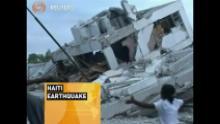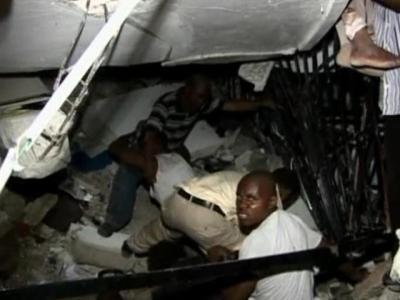PORT-AU-PRINCE, Haiti – Haitians piled bodies along the devastated streets of their capital Wednesday after a powerful earthquake crushed thousands of structures, from schools and shacks to the National Palace and the U.N. peacekeeping headquarters. Untold numbers were still trapped.
President Rene Preval said he believes thousands of people were dead from Tuesday afternoon's magnitude-7.0 quake.
"Parliament has collapsed. The tax office has collapsed. Schools have collapsed. Hospitals have collapsed," Preval told the Miami Herald. "There are a lot of schools that have a lot of dead people in them."
The Roman Catholic archbishop of Port-au-Prince was among the dead, and the head of the U.N. peacekeeping mission was missing.
The international Red Cross said a third of Haiti's 9 million people may need emergency aid and that it would take a day or two for a clear picture of the damage to emerge.
President Barack Obama promised an all-out rescue and humanitarian effort, adding that the U.S. commitment to its hemispheric neighbor will be unwavering.
"We have to be there for them in their hour of need," Obama said.
Other nations — from Iceland to Venezuela — said they would start sending in aid workers and rescue teams. The United Nations saidPort-au-Prince's main airport was "fully operational" and open to relief flights.
Aftershocks continued to rattle the capital of 2 million people as women covered in dust clawed out of debris, wailing. Stunned people wandered the streets holding hands. Thousands gathered in public squares to sing hymns.
People pulled bodies from collapsed homes, covering them with sheets by the side of the road. Passers-by lifted the sheets to see if loved ones were underneath. Outside a crumbled building, the bodies of five children and three adults lay in a pile.
The prominent died along with the poor: the body of Archbishop Joseph Serge Miot, 63, was found in the ruins of his office, said the Rev. Pierre Le Beller of the Saint Jacques Missionary Center in Landivisiau, France. He told The Associated Press by telephone that fellow missionaries in Haiti had told him they found Miot's body.
Preval told the Herald that Haiti's Senate president was among those trapped alive inside the Parliament building. Much of the National Palace pancaked on itself.
The international Red Cross and other aid groups announced plans for major relief operations in the Western Hemisphere's poorest country.
Many will have to help their own staff as well as stricken Haitians. Taiwan said its embassy was destroyed and the ambassador hospitalized. Spain said its embassy was badly damaged.
"Haiti has moved to center of the world's thoughts and the world's compassion," British Prime Minister Gordon Brown said.
Tens of thousands of people lost their homes as buildings that were flimsy and dangerous even under normal conditions collapsed. Nobody offered an estimate of the dead, but the numbers were clearly enormous.
"The hospitals cannot handle all these victims," said Dr. Louis-Gerard Gilles. "Haiti needs to pray. We all need to pray together."
An American aid worker was trapped for about 10 hours under the rubble of her mission house before she was rescued by her husband, who told CBS' "Early Show" that he drove 100 miles (160 kilometers) to Port-au-Prince to find her. Frank Thorp said he dug for more than an hour to free his wife, Jillian, and a co-worker, from under about a foot of concrete.
An estimated 40,000-45,000 Americans live in Haiti, and the U.S. Embassy had no confirmed reports of deaths among its citizens. All but one American employed by the embassy have been accounted for, State Department officials said.
Even relatively wealthy neighborhoods were devastated.
An AP videographer saw a wrecked hospital where people screamed for help in Petionville, a hillside district that is home to many diplomats and wealthy Haitians as well as the poor.
At a destroyed four-story apartment building, a girl of about 16 stood atop a car, trying to see inside while several men pulled at a foot sticking from rubble. She said her family was inside.
"A school near here collapsed totally," Petionville resident Ken Michel said after surveying the damage. "We don't know if there were any children inside." He said many seemingly sturdy homes nearby were split apart.
The U.N.'s 9,000 peacekeepers in Haiti, many of whom are from Brazil, were distracted from aid efforts by their own tragedy: Many spent the night hunting for survivors in the ruins of their headquarters.
"It would appear that everyone who was in the building, including my friend Hedi Annabi, the United Nations' secretary-general's special envoy, and everyone with him and around him, are dead," French Foreign Minister Bernard Kouchner said on RTL radio.
But U.N. peacekeeping chief Alain Le Roy would not confirm that Annabi was dead, saying he was among more than 100 people missing in its wrecked headquarters. He said only about 10 people had been pulled out, many of them badly injured. Fewer than five bodies had been removed, he said.
Brazil's army said at least 11 of its peacekeepers were killed, while Jordan's official news agency said three of its peacekeepers were killed. A state newspaper in China said eight Chinese peacekeepers were known dead and 10 were missing — though officials later said the information was not confirmed.
The quake struck at 4:53 p.m., centered 10 miles (15 kilometers) west of Port-au-Prince at a depth of only 5 miles (8 kilometers), the U.S. Geological Survey said. USGS geophysicist Kristin Marano called it the strongest earthquake since 1770 in what is now Haiti.
Video obtained by the AP showed a huge dust cloud rising over Port-au-Prince shortly after the quake as buildings collapsed.
Most Haitians are desperately poor, and after years of political instability the country has no real construction standards. In November 2008, following the collapse of a school in Petionville, the mayor of Port-au-Prince estimated about 60 percent of buildings were shoddily built and unsafe normally.
The quake was felt in the Dominican Republic, which shares the island of Hispaniola with Haiti, and in eastern Cuba, but no major damage was reported in either place.
With electricity out in many places and phone service erratic, it was nearly impossible for Haitian or foreign officials to get full details of the devastation.
"Everybody is just totally, totally freaked out and shaken," said Henry Bahn, a U.S. Department of Agricultureofficial in Port-au-Prince. "The sky is just gray with dust."
President Barack Obama offered prayers for the people of Haiti and said the U.S. stood ready to help. Rajiv Shah, administrator of the U.S. Agency for International Development, said a disaster response team would fly in Wednesday.
Edwidge Danticat, an award-winning Haitian-American author was unable to contact relatives in Haiti. She sat with family and friends at her home in Miami, looking for news on the Internet and watching TV news reports.
"You want to go there, but you just have to wait," she said. "Life is already so fragile in Haiti, and to have this on such a massive scale, it's unimaginable how the country will be able to recover from this."
___
Associated Press videographer Pierre Richard Luxama in Port-au-Prince and AP writers David Koop and Olga R. Rodriguez in Mexico City; David McFadden and Danica Coto in San Juan, Puerto Rico; Matthew Lee in Washington; Tamara Lush in Tampa, Fla.; and Jennifer Kay and Christine Armario in Miami contributed to this report.
http://news.yahoo.com/s/ap/20100113/ap_on_re_la_am_ca/cb_haiti_earthquake





Tidak ada komentar:
Posting Komentar